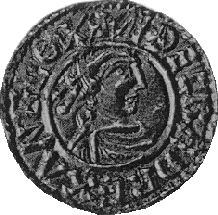Related Research Articles

Ceawlin was a King of Wessex. He may have been the son of Cynric of Wessex and the grandson of Cerdic of Wessex, whom the Anglo-Saxon Chronicle represents as the leader of the first group of Saxons to come to the land which later became Wessex. Ceawlin was active during the last years of the Anglo-Saxon expansion, with little of southern England remaining in the control of the native Britons by the time of his death.
Cynric was King of Wessex from 534 to 560. Everything known about him comes from the Anglo-Saxon Chronicle. There, he is stated to have been the son of Cerdic, who is considered the founder of the kingdom of Wessex. However, the 'Genealogical Regnal List', a copy of which prefaces some manuscripts of the Chronicle instead says that Cynric was the son of Cerdic's son, Creoda. Similarly, the paternal genealogy of Alfred the Great given in Asser's The Life of King Alfred, includes the name Creoda, while the account of the king's maternal ancestry in the same work calls Cynric son of Cerdic.
Egbert is a name that derives from old Germanic words meaning "bright edge", such as that of a blade. Anglo-Saxon variant spellings include Ecgberht and Ecgbert. German variant spellings include Ekbert and Ecbert.
Æthelberht, Aethelbert or Ethelbert is a masculine given name which may refer to:

Æthelred or Ethelred is an Old English personal name and may refer to:

Cynegils was King of Wessex from c. 611 to c. 642. Cynegils is traditionally considered to have been King of Wessex, but the familiar kingdoms of the so-called Heptarchy had not yet formed from the patchwork of smaller kingdoms in his lifetime. The later kingdom of Wessex was centred on the counties of Hampshire, Dorset, Somerset and Wiltshire but the evidence of the Anglo-Saxon Chronicle is that the kingdom of Cynegils was located on the upper River Thames, extending into northern Wiltshire and Somerset, southern Gloucestershire and Oxfordshire, and western Berkshire, with Dorchester-on-Thames as one of the major royal sites. This region, probably connected to the early tribal grouping known as the Gewisse, a term used by Bede for the West Saxons, lay on the frontier between the later kingdoms of Wessex and Mercia.
Ceolwulf was a King of Wessex. At that early date the West Saxons were called the Gewisse, and in his Dictionary of National Biography entry he is given the title "king of the Gewisse". According to the Anglo-Saxon Chronicle he reigned from 597 to 611 and the Annals of St Neots also allot him fourteen years. The West Saxon Genealogical Regnal List gives him a reign of seventeen years, but in the view of Barbara Yorke this is probably an error.
Ceol was King of Wessex from 592 to 597.
Cwichelm is a masculine English given name. Notable people with the name include:
Æthelwold was a common Anglo Saxon name. It may refer to:

Archenfield is the historic English name for an area of southern and western Herefordshire in England. Since the Anglo-Saxons took over the region in the 8th century, it has stretched between the River Monnow and River Wye, but it derives from the once much larger Welsh kingdom of Ergyng.
Ælfric is an Anglo-Saxon given name.
Haimo, also spelled Hamo, Heimo, Hamon, Haim, Haym, Heym, Aymo, Aimo, etc., is a masculine given name of Germanic origin. The Old French forms are Haimon, Aymon, Aimon, Aymes. It is a hypocoristic form of various Germanic names beginning with the radical haim-, meaning "home".
The name Eoppa is an Anglo-Saxon given name appearing in two traditional pedigrees:
Cuthwulf, also sometimes Cutha, was the third son of Cuthwine, and consequently a member of the House of Wessex. Although a member of the direct male line from Cynric to Egbert, Cuthwulf was never king. He is said to have been born circa 592, and his death date is unknown.

Agilbert was the second bishop of the West Saxon kingdom and later bishop of Paris.
Æthelric is a masculine Anglo-Saxon name that may refer to:
Events from the 6th century in England.

St Olave's Church, Southwark was a church in Southwark, England which is believed to be mentioned in the Domesday Book. It was located on Tooley Street which is named after the church, i.e. 't'olous'. It became redundant in 1926 and was demolished. It is now the location of St Olaf House, which houses part of the London Bridge Hospital.
References
- ↑ "Cuthwulf". PASE Domesday.